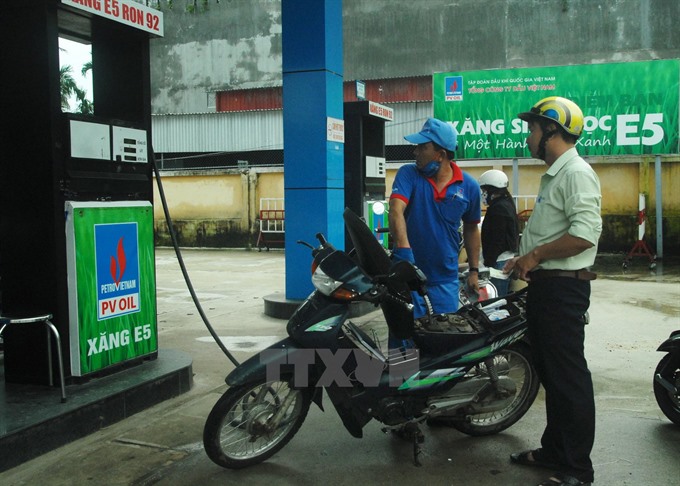 Economy
Economy

Experts and businesses are raising concerns about the shortage of E5 bio-fuel supply as there are two months left for E5 to be fully replaced RON 92 petrol.
 |
| Customers would prefer using A95 instead of E5 when the Government terminates the use of petrol A92 in the market. — VNA/VNS Photo Sỹ Thắng |
HÀ NỘI — Experts and businesses are raising concerns about the shortage of E5 bio-fuel supply as there are two months left for E5 to be fully replaced RON 92 petrol.
Moreover, they are worried about the monopoly in material supply for E5 mixing.
Việt Nam will replace RON 92 petrol with E5 bio-fuel from the beginning of 2018, and with E10 after 2019. E5 petrol is a mix of A92 petrol (95 per cent) and bio-fuel ethanol (five per cent).
A report from HCM City’s Department of Industry and Trade earlier this week showed that most local bio-fuel ethanol production plants have operated at low capacity due to unstable input. High input prices and loss rate in preservation process have led to an increase in ethanol production fees.
According to online newspaper Pháp luật thành phố Hồ Chí Minh (HCM City Law), prices of petrol A92 and A95 in the world market have been stable following an increase in 2016, and are currently on a downward trend. It is the reason why many petrol traders have increased their imports for stockpile.
E5 trading is in pilot implementation in some localities that lack integration, thus affecting E5 distribution, the department said.
It added that customers would prefer using A95 instead of E5 when the Government terminates the use of petrol A92 in the market.
Bio-fuel E5 depends a lot on ethanol supply for its mix. The country would need more than 275,000cu.m of ethanol per year to fully replace A92 petrol by E5.
Currently, the supply of bio-fuel ethanol for E5 petrol comes mainly from two plants owned by Tùng Lâm Joint Stock Company, which have total annual capacity of 200,000cu.m, resulting in a shortage of some 75,000cu.m a year.
The department said the Government should have a roadmap to invest in storage tanks, import amount and A95 reserve to avoid shortage in the market.
It added that some firms in the city sent documents asking to temporarily halt E5 trading due to low consumption and commission which could not offset operation costs.
The current commission for E5 bio-fuel is VNĐ1,000-1,600 per litre, which is not attractive to petrol traders. Moreover, the selling price of E5 bio-fuel is not much cheaper than A92 (VNĐ230 per litre), discouraging both customers and traders from using the fuel.
It said the Government should ask relevant ministries and agencies to implement policies on tax reduction and exemption to reduce E5 prices by VNĐ1,000-2,000 less than A92 to attract customers.
Sharing the ideas, a representative from Củ Chi Industrial Development and Investment Company told the newspaper that consumption of A95 would be increased after A92 petrol termination.
Phan Thế Ruệ, chairman of Việt Nam Petroleum Association, said consumers have not paid much attention to E5 although it has been sold parallel with A92 petrol in the market. E5 consumption accounted for only nine per cent of the total.
Ruệ said total termination of A92 petrol would make customers shift partly to E5. However, it one could not avoid a preference for A95 over E5, especially among those with automobiles.
Ethanol supply from a sole company could possibly result in a monopoly in the market and affect customers.
He suggested that the Government resume the operation of ethanol plants in the central region and in Bình Phước Province.
Trần Ngọc Năm, Petrolimex deputy general director, said the group has striven to ensure A95 supply in case of its increasing demand.
He said the group has prepared two plans to ensure ethanol demand -- buying ethanol from local plants and imports. — VNS




